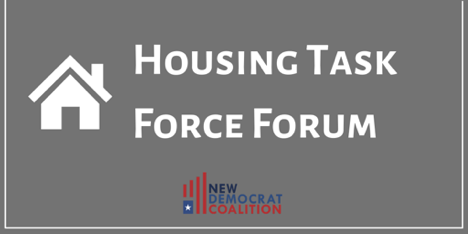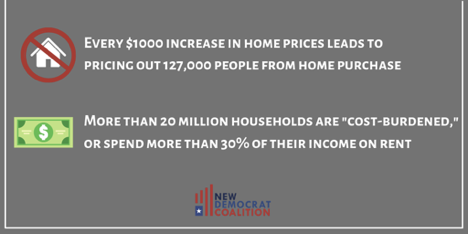The Ecosystem of the Housing Market Today

America faces a housing shortage that totals millions of housing units across the country. Home prices and rents are rising faster than wages, and construction is not keeping up with demand. Recently, New Democrat Coalition (NDC) Housing Task Force Co-Chairs Reps. Denny Heck, Katie Hill and Ben McAdams held a forum with two panels to address various challenges that contribute to America’s housing crisis. The first panel included Dr. Corianne Payton Scally, the Principal Research Associate in the Metropolitan Housing and Communities Policy Center at the Urban Institute; Chris Gamvroulas, President of Ivory Development; and Diane Yentel, President and CEO of the National Low-Income Housing Coalition (NLIHC).
The Coalition formed the Housing Task Force over two years ago to study the state of housing affordability in this country. After several meetings and forums with stakeholders and experts, the Task Force released its preliminary findings report: Millions of Missing Homes. Housing Task Force Co-Chair Rep. Denny Heck distills the report down to two points: “Number one, we have a housing shortage. By the least estimate, there are five million fewer housing units in this country than there is demand for. It’s no surprise when you consider that in the 1970’s we were building approximately 12,000 units per year per million people and over the last decade we have averaged 5,000. Clearly the provision of housing has not kept pace with demand. The second major finding with our report is that this does, in fact, cut across the spectrum. It is obviously felt most egregiously and most tragically in the lower-income portion of the scale, resulting in more people that are incredibly rent-burden and making hard choices on what it is they are able to provide for themselves and their family.”
Bottom line: There are too few housing units in America. We need to build more housing units for all shapes and sizes for all our neighbors.
Dr. Corianne Payton Scally, Principal Research Associate in the Metropolitan Housing and Communities Policy Center at the Urban Institute discussed the strain that increasing housing costs are putting on people’s lives. “An unexpected financial shock can push vulnerable households toward difficulty in paying for housing costs,” said Scally. “There are a variety of solutions to explore to help expand supply, increase affordability, and improve housing stability in the lives of many Americans. First, funding for housing and infrastructure could provide incentives to inspire innovation in housing regulations and housing types. The result could be more housing of various kinds and at different costs to meet the diverse needs of today’s households. Second, funding preservation of existing affordable units can reduce displacement and maintain a quality, affordable rental housing supply. This includes creative solutions for financing the preservation and renovation of unsubsidized private?sector affordable units, as well as publicly?funded ones. Third, expanding housing assistance would stabilize more of our most vulnerable households. This could include income supports like tax credits and ensuring that more households who qualify for housing assistance receive it. Fourth, ending discrimination in housing transactions is paramount to ensuring equitable access for all, including expanding protections and increasing enforcement. Finally, the path to homeownership can be widened for households with lower incomes, and obstacles removed. Innovations in credit scoring and improved financing for smaller mortgages could improve access to homeownership.

Chris Gamvroulas, President of Ivory Development, raised issues of regulatory burdens that impose costs on the development of land and the construction of homes which often ends up pushing the price of housing beyond the means of many middle-class working families. “We in Utah believe that we have some great ideas that can serve as an example for other states and certainly the federal government,” said Gamvroulas. “The Utah Commission on Housing Affordability, of which I am a member on behalf of the Utah Homebuilders Association, proposed groundbreaking legislation that did two primary things. First, it enumerated a list of 23 strategies that local officials could choose from to create and support the development of moderate incoming housing in their jurisdiction. Second, it tied state transportation infrastructure funding to compliance with those plans. The federal government could easily borrow that concept and tie federal transportation dollars to state, county, and local governments who encourage and facilitate adequate numbers of low- and moderate-income housing units across our country.”
NDC Housing Task Force Co-Chair Rep. Ben McAdams, former mayor of Salt Lake County, highlighted the direct impacts of the housing crisis on families. “In my state of Utah, housing prices continue to rise dramatically, and the area is facing a shortage of thousands of homes. For reference, the price of a new median home in 2018 was 61% more than the price in 2010. That’s an incredible inflation rate in a short amount of time and surrounding counties have had a similar increase. Since 2010, new households in Utah have outnumbered new housing units by almost 40,000, so that’s just in Utah alone. Around the country, that’s when you get to missing millions of homes, and really the scope and depth of this challenge.”
“The housing crisis is a solvable problem,” said Diane Yentel, President & CEO of the National Low-Income Housing Coalition. “The truth is, as a country, we chose to allow homelessness and housing poverty to exist. We could choose otherwise?—?we have the data, the research, proven solutions and, certainly, as a country, we have the resources. We lack only the political will to fund the solutions at the scale necessary.” Yentel adds, “We are already paying for the housing crisis. Inaction is expensive. We should invest in solutions to make homes affordable to the lowest-income people by significantly expanding programs like the national Housing Trust Fund, rental assistance through expanded Section 8 vouchers or a renters’ tax credit, and preserving the affordable homes that already exist.”
The NDC believes that while local and state governments need to act, Congress needs to be doing more at the federal level as well. To accommodate a growing population and other sources of new demand, as the NDC report notes, America is going to need more than a million additional housing units per year. This shocking reality is why NDC Members will continue to engage with stakeholders and constituents to better understand the contributing problems so Congress can better address the housing crisis.
Watch the full panel on Facebook here.
By: New Democrat Coalition
Next Article Previous Article
